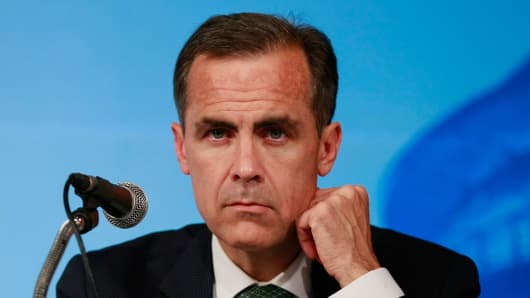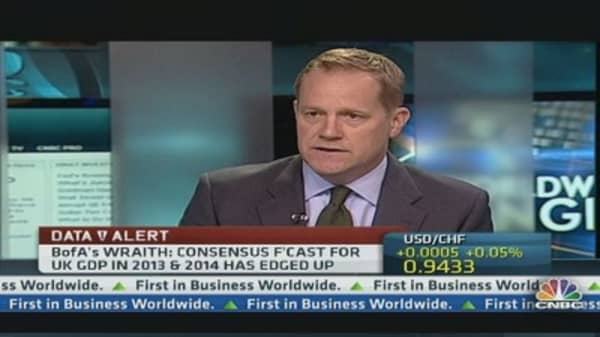The U.K. economy is likely to get another dose of monetary stimulus with the arrival of Mark Carney as the new governor of the Bank of England, as the former governor of Canada's central bank sets out to tackle what some have called "mission impossible".
Mark Carney starts his new role at the Bank of England on Monday. Economists told CNBC he will not follow in the footsteps of the U.S. Federal Reserve, which has signaled an end to its stimulus.
Fed Chairman Ben Bernanke blinked first last Wednesday by offering a road map on how quantitative easing (QE) could be moderated in the U.S. Sovereign bond yields have since risen sharply off record lows, with 10-year bonds for both the U.K. and U.S. breaching the 2.5 percent level.
(Read More: Currency War Could Heat Up When Carney Joins BoE)
"What will Mr Carney make of the 'carnage'?," Andy Chaytor, a fixed income strategist at Nomura said. "Mr Carney and the rest of the MPC (Monetary Policy Committee) probably are not very happy with the [bond market] moves."
Several high profile organizations, including the Bank of International Settlements, have applauded the "tapering" mooted by the Fed but Chaytor thinks Carney will move in the opposite direction.
"In due course we expect Mr Carney to provide support to the front-end [of the bond yield curve], but as we have seen in recent weeks, timing that move correctly is the hard bit," he said.
(Read More: Bank of Canada's Carney Says Europe Needs Big Reforms)
The action begins in week one for Carney, with a monthly monetary policy decision just three days into his tenure. The central bank won't act next Thursday, according to U.K. economist Howard Archer at IHS Global Insight. But an extra 25 billion pounds ($38 billion) will be added to its current 375 billion pound QE program soon, he told CNBC.
"This possibility may well have been increased by the revised GDP data showing that the economy is currently operating at a level further below the peak level seen in the first quarter of 2008 than previously thought. Carney himself may be particularly keen to establish his presence and to build up escape velocity. A desire to counter rising bond yields could also encourage more QE," he said.
Archer added that Carney is likely to adopt the U.S.-style policy of giving guidance on the future path of interest rates. But a decision will not be imposed single-handedly by the bank's chief. The MPC's voting policy – one person one vote – means Carney is just one voice in nine.
'Abenomics' for the UK?
Carney may have quelled a media storm over his 874,000 pound salary ($1.34 million) and generous housing allowance, but far greater hurdles await.
(Read More: Millionaire Homes Mark Carney Can Afford)
Britain is stuck in its slowest economic recovery on record. Growth is 3.9 percent below its pre-recession peak, according to fresh data from the Office for National Statistics on Thursday. But sharp rises in both manufacturing and services PMIs (Purchasing Managers' Index) in June have offered hope that the recovery is underway. Inflation also remains under control at 2.7 percent, albeit still above target.
But these so-called "green shoots" are not enough for Guy LeBas, chief fixed income strategist at Janney Montgomery Scott who told CNBC that U.K. growth is still sluggish.
"Given disappointing economic trends in the U.K., it seems likely that we'll see an expansion of the asset purchase program before the year is out," he said.
(Read More: UK Economy: Pre-Crisis Levels to Remain Elusive)
"Stimulus from the BoE (Bank of England) should serve to shore up the belly of the [bond yield] curve in particular, but lower 2-5 year Gilt rates are the mechanism, not the goal of any stimulus."
Bill Blain, a strategist and head of special situations group at Mint Partners believes the "big ease" by central banks has distorted markets and says QE is now compromised. Any further stimulus will instead form part of a multi-pronged attack similar to Japan's "Abenomics", Blain said. Under that plan, which refers to the economic policies advocated by the Prime Minister of Japan Shinzo Abe, structural reforms are introduced alongside asset purchases in order to revive the economy.





